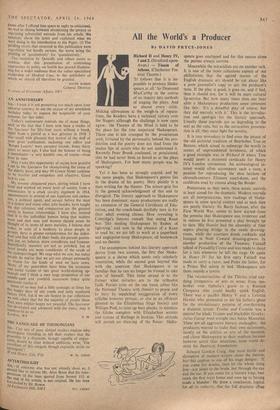AN ANNIVERSARY trust it is not presuming too much upon
your editorial courtesy to use the excuse of my seventieth birthday today to request the hospitality of your columns for this letter.
Today's anniversary reminds me of many things, such as the fact that I have now been a reader of the Spectator for fifty-four years without a break, apart from a period as a war prisoner in 1918. I also recall with pleasure that several of the staff of Your great publication, including one editor and Bengal Lancer,' were personal friends. Some thirty years or more ago, I also had the honour of being a contributor--a very humble one, of course—from time to time.
May I take this opportunity of saying how grateful I am to the Spectator for championing the cause of the elderly poor, and may 99 Gower Street continue to be fearless and outspoken and objective. Good luck to you. My.seventy chequered years, during which I have lived and worked on every level of society from a commission in a crack cavalry regiment in 1914, aPpointments in several of our legations and embas- sies, a political agent, and service before the mast in a tanker and many other jobs besides, have taught me that tolerance and compassion' are the greatest assets in human relationships. I have also learned that it is the individual human being that matters most and that men and women should never be thought of in terms of mere statistics. I believe that today, in spite of a tendency to place people in groups, there is greater consideration for the indivi- dual and that with all their faults the present genera- tion are, on balance, more considerate and humane. Superficially manners are not so polished, but at heart people are more considerate of the needs of the underprivileged. We reap what we sow, but today People do realise that we are not always personally to blame for the kinds of seed we have sown. Many of my generation have been the economic and social victims of two great world-shaking up- heavals and I think a very large proportion of our middle-aged and youthful successors today quite genuinely realise it.
Some of us may feel a little nostalgic at times for the happy days of our youth and early manhood
before 1914, but if we are honest in our reflections we Will admit that for the majority of people those has were neither happy nor peaceful. The Spectator nas developed and advanced with the times; may it continue to do so.






































 Previous page
Previous page